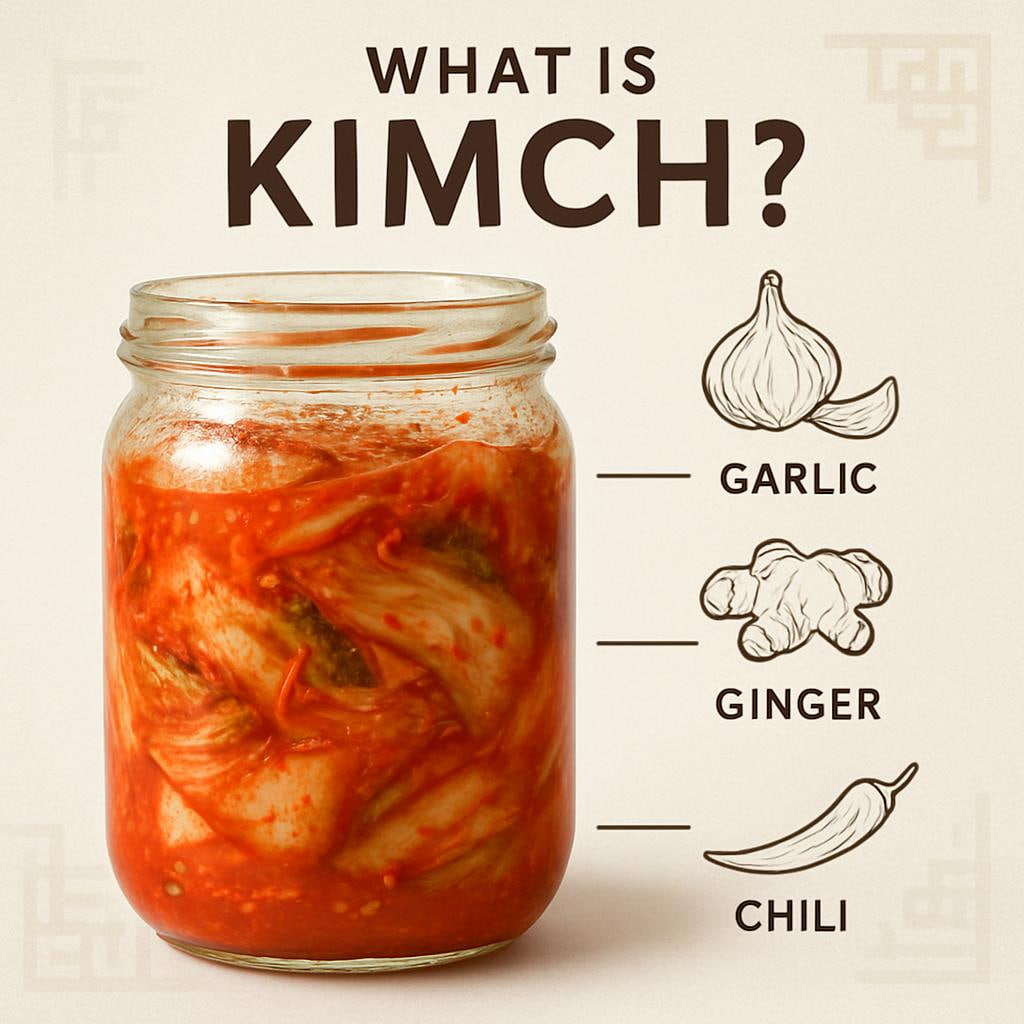Kimchi is rich in probiotics, vitamins, and antioxidants that may support gut health, immunity, and overall wellness.
This traditional Korean dish, made from fermented cabbage, radish, garlic, and chili, has become globally recognized for its nutritional power. Understanding kimchi’s health benefits helps you incorporate this flavorful food into your diet for long-term well-being. From digestive balance to heart health, science confirms that kimchi offers more than just taste — it’s a fermented food with proven nutritional and wellness advantages.

What Is Kimchi?
Kimchi is a traditional Korean fermented dish made primarily from napa cabbage (Brassica rapa subsp. pekinensis) and Korean radish (Raphanus sativus var. longipinnatus), seasoned with chili pepper flakes (gochugaru), garlic, ginger, scallions, and occasionally a small amount of salted seafood such as fish sauce or shrimp paste.
This iconic dish is a cornerstone of Korean cuisine and cultural identity. The communal tradition of preparing kimchi, known as “Kimjang,” has been recognized by UNESCO as an Intangible Cultural Heritage of Humanity for its social and nutritional significance. The fermentation process transforms raw vegetables into a nutrient-rich, tangy, and probiotic-packed food, enhancing both its flavor and health-promoting properties.
During fermentation, beneficial lactic acid bacteria (LAB) naturally present on vegetables convert sugars into lactic acid, which acts as a preservative and gives kimchi its distinctive sour taste. Two of the dominant bacterial strains, Lactobacillus plantarum and Leuconostoc mesenteroides, play a vital role in flavor development and are known to support gut health and immune function through their probiotic effects.
According to the Korean Food Promotion Institute (Hansik Portal) and the World Institute of Kimchi (WiKim), more than 200 regional varieties of kimchi exist across Korea, differing in ingredients, spice levels, and fermentation duration. These range from the mild, watery baek-kimchi (white kimchi) to the spicy, whole-cabbage poggi-kimchi.

Nutritional Profile of Kimchi (Per 100 g)
Kimchi is a low-calorie, nutrient-dense, and probiotic-rich food that contributes vitamins, fiber, and bioactive compounds to your diet. Its nutrient composition varies slightly depending on ingredients and fermentation duration, but the base values below are provided by the USDA FoodData Central database.
| Nutrient | Amount (per 100 g) | Key Health Role |
|---|---|---|
| Calories | 15 kcal | Very low energy density, suitable for weight-conscious diets |
| Protein | 1.1 g | Supports muscle and tissue repair |
| Total Fat | 0.5 g | Minimal fat content |
| Carbohydrates | 2.4 g | Provides light, natural energy |
| Dietary Fiber | 1.6 g | Aids digestion and supports gut motility |
| Vitamin C | 20 mg (22% DV) | Supports immune function and antioxidant defense |
| Vitamin K | 43 µg (36% DV) | Essential for bone metabolism and blood clotting |
| Folate (B9) | 52 µg (13% DV) | Vital for cell repair and red blood cell production |
| Sodium | 498 mg (21% DV) | Natural preservative; monitor intake if sodium-sensitive |
| Probiotics | Varies | Live beneficial bacteria from fermentation, including Lactobacillus plantarum and Leuconostoc mesenteroides |
Kimchi’s fermentation enhances nutrient bioavailability and adds beneficial compounds such as organic acids, vitamin B12, and short-chain fatty acids (SCFAs), which are known to support metabolic and digestive health.
Its combination of fiber, antioxidants, and probiotics makes it a uniquely functional food — offering both nutritional value and potential wellness benefits when enjoyed as part of a balanced diet.
10 Proven Health Benefits of Kimchi (Backed by Science)
Scientific studies increasingly confirm that kimchi’s unique blend of probiotics, fiber, and phytonutrients supports multiple aspects of health. Below are ten evidence-based benefits of kimchi — all grounded in current nutrition and medical research.
1. Supports a Healthy Gut Microbiome

Kimchi is one of the richest natural sources of probiotics, primarily Lactobacillus plantarum and Leuconostoc mesenteroides. These beneficial bacteria support gut microbial balance, which is essential for digestion and nutrient absorption.
A study by Stanford Medicine (2021) found that a diet high in fermented foods — including kimchi — significantly increased gut microbiome diversity and lowered inflammation in adults.
Regular consumption of kimchi may support digestion, bowel regularity, and immune defense, while also helping the body adapt to dietary changes naturally.
2. May Enhance Immune Function

A balanced gut is closely tied to immune health. The probiotics in kimchi — notably Lactobacillus plantarum — have been shown to support immune cell activity, potentially enhancing the body’s natural defense responses.
In addition, kimchi’s high levels of vitamin C, beta-carotene, and polyphenols help protect immune cells from oxidative damage.
According to Harvard T.H. Chan School of Public Health, probiotics can support immune system regulation and reduce inflammation, which is vital for overall resilience against infections.
3. Helps Maintain Healthy Cholesterol Levels
Kimchi’s fermentation process produces short-chain fatty acids (SCFAs), which may help regulate lipid metabolism.
A 2023 human trial in the Journal of Ethnic Foods found that regular kimchi intake led to reductions in LDL (“bad”) cholesterol and triglycerides, while maintaining or increasing HDL (“good”) cholesterol.
These effects, combined with garlic’s allicin and chili’s capsaicin compounds, may support arterial health and improve long-term cardiovascular wellness.
4. Supports Healthy Weight Management

Kimchi is naturally low in calories (about 15 kcal per 100 g) and rich in fiber, making it a nutrient-dense food that promotes fullness and balance within a healthy diet. Its unique combination of probiotics, fiber, and bioactive plant compounds may support metabolic health and weight regulation when consumed regularly as part of a balanced meal plan.
Recent evidence published in Nutrition Reviews (Oxford Academic, 2024) found that higher kimchi intake was significantly associated with lower body weight, body mass index (BMI), and body fat percentage among adults. The analysis concluded that fermented kimchi may help promote weight management through several mechanisms, including improved gut microbiota balance, enhanced lipid metabolism, and better appetite control (Nutrition Reviews – Oxford Academic, 2024).
These benefits are not due to any “fat-burning” property, but rather the synergistic effects of probiotics and dietary fiber that help maintain a healthy metabolism and reduce overeating. When paired with nutrient-rich whole foods such as brown rice, tofu, or vegetables, kimchi can be an effective part of a sustainable weight-management strategy.
Tip: For balanced results, enjoy 50–100 g (2–4 tablespoons) of kimchi daily as a side dish or ingredient, rather than relying on it as a sole weight-loss solution.
5. Promotes Digestive Health

Kimchi’s lactic acid bacteria help maintain a slightly acidic intestinal environment, supporting the growth of beneficial microbes while suppressing potentially harmful bacteria.
According to the National Center for Complementary and Integrative Health (NCCIH), probiotics may help support digestion and reduce occasional bloating.
Pairing kimchi with prebiotic-rich foods such as garlic, onions, or oats enhances this synergy, supporting smoother digestion and consistent bowel health.
6. Rich in Antioxidants

The colorful mix of cabbage, chili, and garlic gives kimchi its potent antioxidant profile. It’s naturally rich in vitamin C, beta-carotene, and phenolic compounds that may help protect cells from oxidative stress.
A 2024 review in the Journal of Ethnic Foods highlighted that these antioxidants support healthy aging by neutralizing free radicals and protecting against cellular damage.
Consuming kimchi regularly may therefore support skin health, vitality, and general wellness through oxidative balance.
7. May Support Heart Health

Multiple studies suggest that kimchi consumption is linked to improved cardiovascular markers. By reducing LDL cholesterol and triglycerides and supporting vascular flexibility, kimchi may help maintain heart health.
The presence of garlic (rich in allicin) and chili (containing capsaicin) further enhances blood circulation and may support healthy blood pressure levels.
According to the American Heart Association, fermented vegetables like kimchi can be part of a heart-healthy diet when consumed in moderation.
8. May Help Regulate Blood Sugar

Kimchi’s natural combination of fiber, antioxidants, and probiotic bacteria may support healthier blood sugar control and metabolic balance. By improving gut microbiota composition and slowing carbohydrate absorption, fermented kimchi can help stabilize glucose levels when included as part of a balanced diet.
A controlled clinical study published in Nutrition Research (2013) found that individuals with prediabetes who consumed fermented kimchi for eight weeks experienced significant improvements in fasting blood glucose and insulin sensitivity compared to those who ate fresh (non-fermented) kimchi. These changes were attributed to probiotic-induced modulation of gut flora and enhanced lipid metabolism (Nutrition Research – PubMed, 2013).
Further evidence from a recent meta-analysis in Nutrition Reviews (2024) supports these findings, noting that regular kimchi consumption was associated with reduced fasting glucose levels and improved overall glycemic control in adults (Nutrition Reviews – PubMed, 2024).
Together, these studies suggest that fermented kimchi, when paired with high-fiber foods and regular exercise, may help support metabolic health and balanced blood sugar levels. However, it should be consumed as part of a diverse, nutrient-rich diet — not as a substitute for medical management of diabetes or other metabolic conditions.
9. Supports Brain and Mood Balance

The connection between the gut and brain, known as the gut-brain axis, plays a key role in emotional regulation, cognition, and mental clarity. A balanced gut microbiome supports the production of neurotransmitters such as serotonin and gamma-aminobutyric acid (GABA) — both of which are critical for maintaining mood stability and reducing stress.
Kimchi’s probiotics, particularly Lactobacillus plantarum and Leuconostoc mesenteroides, may contribute to this process by enhancing gut microbial diversity and reducing systemic inflammation — two factors linked with improved emotional well-being.
Recent research published in Frontiers in Microbiology (2024) reviewed how probiotic-rich diets influence the gut-brain axis, noting that fermented foods can help modulate stress hormones, improve cognitive function, and support mood regulation through neuroimmune and metabolic pathways (Frontiers in Microbiology – 2024).
While more direct studies on kimchi’s mental health effects are needed, its probiotic content and anti-inflammatory properties make it a valuable addition to a brain-friendly diet. Combined with regular exercise, quality sleep, and a nutrient-rich eating pattern, kimchi may help support emotional balance, focus, and resilience naturally.
10. Contributes to Overall Wellness and Longevity

As a nutrient-dense, low-calorie fermented food, kimchi delivers vitamins A, C, K, and folate, plus bioactive compounds that may support longevity.
A 2023 review published in Nutrients highlighted fermented vegetables’ potential role in promoting metabolic balance, reducing inflammation, and supporting overall well-being.
When enjoyed as part of a diverse, plant-forward diet, kimchi can be a sustainable contributor to long-term health and vitality.
Possible Side Effects and Precautions
While kimchi is widely regarded as a nutritious and probiotic-rich food, it’s important to consume it mindfully — especially if you have certain health conditions. Most people can safely enjoy kimchi as part of a balanced diet, but a few factors deserve attention for optimal safety and wellness.
1. High Sodium Content
Traditional kimchi recipes rely on salt to preserve vegetables and control fermentation. As a result, kimchi can be high in sodium, averaging around 500 mg per 100 grams.
Excess sodium intake may contribute to elevated blood pressure and water retention in sensitive individuals. The U.S. Food and Drug Administration (FDA) recommends limiting daily sodium intake to less than 2,300 mg for healthy adults.
👉 To reduce sodium, choose low-salt kimchi or rinse it lightly before serving.
2. Digestive Sensitivity
Kimchi’s probiotics and fiber may temporarily cause bloating or gas as your digestive system adjusts — especially if you’re new to fermented foods. These effects are generally mild and short-lived.
If you have conditions like irritable bowel syndrome (IBS), start with small portions (1–2 tablespoons) and increase gradually as tolerated.
3. Food Safety and Proper Fermentation
Safe fermentation and proper storage are essential for preserving kimchi’s nutritional value, flavor, and probiotic integrity while preventing harmful bacterial growth. Because kimchi is a live fermented food, maintaining the correct hygiene, acidity, and temperature helps ensure both safety and quality.
To minimize the risk of foodborne illness:
- Use clean utensils, jars, and cutting boards to prevent cross-contamination during preparation.
- Refrigerate kimchi at or below 40°F (4°C) once fermentation is complete. Cold storage slows microbial activity and maintains beneficial probiotic levels. The Centers for Disease Control and Prevention (CDC) emphasizes that keeping perishable foods at safe refrigeration temperatures is crucial to preventing the growth of foodborne pathogens.
- Discard kimchi immediately if you notice mold growth, unpleasant odors, bulging lids, or a slimy texture — these are clear signs of spoilage.
- Maintain a pH below 4.6 and a salt concentration of 2–3% during fermentation to create an acidic environment that inhibits harmful bacteria such as Clostridium botulinum and Listeria monocytogenes.
- The U.S. Department of Agriculture (USDA) National Institute of Food and Agriculture provides science-based recommendations for fermenting vegetables safely at home, emphasizing correct acidity, cleanliness, and temperature control throughout the process.
By following these evidence-based food safety practices, you can enjoy kimchi that remains safe, flavorful, and rich in probiotics, while minimizing any risk of foodborne illness.
By following these science-based guidelines, you can enjoy kimchi safely while preserving its live probiotics and rich nutritional value.
4. Special Populations
- Pregnant or breastfeeding individuals should consume only properly fermented, refrigerated kimchi.
- People with kidney disease or hypertension should monitor sodium intake closely.
- Children can enjoy small portions if salt levels are moderate and the kimchi isn’t overly spicy.
Maintaining moderation and proper handling ensures you gain kimchi’s health benefits without unnecessary risk.
How to Eat Kimchi for Best Results
Kimchi is versatile and can be enjoyed in many ways — raw, as a side dish, or incorporated into your favorite recipes. To maximize nutritional and probiotic benefits, consider the following evidence-based recommendations.
Recommended Serving Size
For most adults, 50–100 grams per day (about 2–4 tablespoons) provides beneficial probiotics and nutrients without excess sodium. Regular, moderate intake is more beneficial than consuming large amounts occasionally.
Best Ways to Eat Kimchi
- As a side dish: Serve kimchi alongside rice, grilled fish, or lean meats to enhance flavor and digestion.
- In salads and wraps: Combine with fresh greens, sesame oil, or avocado for balanced nutrition.
- In soups or stews: Add kimchi toward the end of cooking to retain some probiotic content.
- With whole grains: Pair kimchi with brown rice, quinoa, or barley to improve fiber and satiety.
Food Pairing Suggestions
| Food Type | Example | Why It Works |
|---|---|---|
| Whole grains | Brown rice, oats | Complements probiotics with prebiotic fiber |
| Proteins | Eggs, tofu, chicken | Balances macronutrients |
| Vegetables | Cucumber, spinach | Adds vitamins and hydration |
| Fermented foods | Yogurt, miso | Boosts gut microbiome diversity |
Storage and Handling Tips
To preserve kimchi’s probiotics and flavor:
- Store in an airtight glass or ceramic container.
- Keep refrigerated at ≤ 40°F (4°C) to slow fermentation.
- Use clean utensils to prevent contamination.
- Avoid prolonged air exposure to maintain freshness.
According to Harvard Health Publishing, fermented foods like kimchi support gut health best when kept cold and consumed fresh.
Frequently Asked Questions (FAQs)
Q1. Is kimchi good for digestion?
Yes. Kimchi is rich in probiotics that support healthy gut bacteria, promoting better digestion and nutrient absorption.
Q2. Can I eat kimchi every day?
Yes, in moderation. A small daily serving (50–100 g) can be part of a healthy diet, but choose lower-sodium versions to maintain balance.
Q3. Does heating kimchi kill its probiotics?
Cooking kimchi at high temperatures destroys live probiotics. For maximum benefit, enjoy it raw or add it to dishes after they’ve cooled slightly.
Q4. Is kimchi suitable during pregnancy?
Properly fermented, refrigerated kimchi is generally safe for healthy pregnancies. However, it’s best to consult your healthcare provider, especially if you’re sensitive to spicy or high-sodium foods.
Q5. Can kimchi go bad?
Yes. Signs of spoilage include mold growth, slimy texture, or an unpleasant odor. Store kimchi in airtight containers under refrigeration.
Q6. Does kimchi have any side effects?
Some people may experience mild gas or bloating initially. This usually subsides as your body adjusts to increased probiotic intake.
Q7. How long does kimchi last?
Properly stored kimchi can last 3–6 months in the refrigerator, gradually becoming tangier as fermentation continues.
Conclusion
Kimchi is a time-honored Korean fermented food celebrated for its nutrient density, probiotics, antioxidants, and unique flavor. It may support digestion, immune function, heart health, and overall wellness when enjoyed regularly and safely.
To maximize benefits, choose properly fermented, refrigerated kimchi, and consume moderate portions daily as part of a balanced diet rich in vegetables, whole grains, and lean proteins.
By blending traditional craftsmanship with modern nutrition science, kimchi offers a simple yet powerful way to support long-term well-being.
This content is for informational purposes only and not medical advice.
References:
